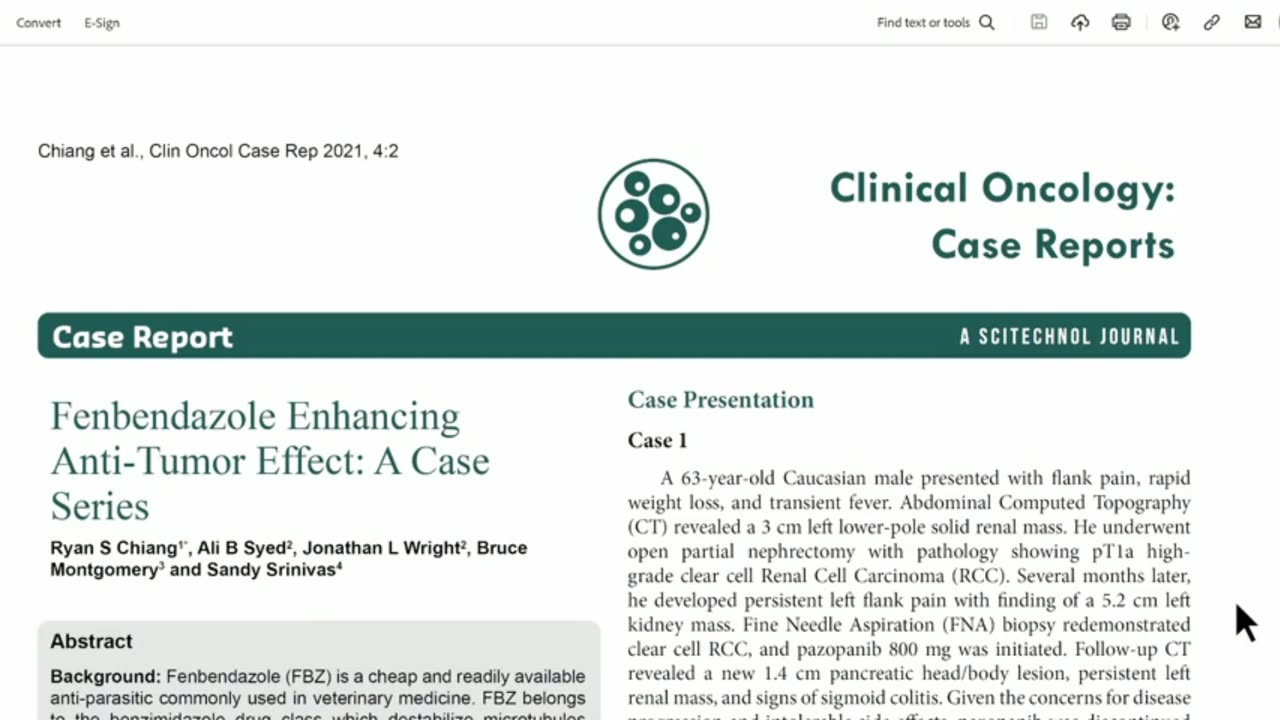Premium Only Content

Can Fenbendazole Cure Cancer?
Can Fenbendazole Cure Cancer?
According to a case series published in an oncology journal, the answer could be a resounding yes.
The case report highlights three cancer patients who were in pretty bad shape. But after taking fenbendazole, they all experienced a complete remission.
What Is Fenbendazole, and How Does it Work?
Fenbendazole (FBZ) is a medicine originally designed to treat worms and parasites in animals. Its sister drugs, Mebendazole and Albendazole, have had remarkable success treating similar ailments in humans with few side effects.
Recently, anecdotal reports have praised fenbendazole as a potentially miraculous anti-cancer drug. It works by destabilizing microtubules, the structures that help cancer cells divide and grow. By disrupting this process, fenbendazole effectively halts cancer cell division and slows or stops tumor growth.
Miraculous Recoveries After Taking Fenbendazole
Case series #1 features a 63-year-old man with advanced kidney cancer (clear cell renal carcinoma) who experienced tumor recurrence and severe side effects from multiple cancer therapies, including surgery and two different medications.
With no effective options left, he turned to fenbendazole (FBZ), taking 1 gram three times a week at a friend’s suggestion. Over the next 10 months, his tumors—including those in his pancreas and spine—showed near-complete resolution on imaging. Remarkably, he experienced no side effects from FBZ, and follow-up scans have shown no signs of recurrence.
Case series #2 follows a 72-year-old man with metastatic urethral cancer that had spread to his lungs, lymph nodes, and brain. Despite undergoing multiple rounds of chemotherapy and radiation, one lymph node continued to grow, resisting all treatments.
Seeking alternatives, he decided to try fenbendazole (FBZ), taking 1 gram three times a week, along with vitamin E, curcumin, and CBD oil, while postponing further conventional therapies. Over the next nine months, imaging revealed a dramatic response, with the lymph node shrinking significantly until it completely resolved. Remarkably, he reported no side effects during this period.
Case series #3 focuses on a 63-year-old woman diagnosed with a large, invasive bladder tumor. Facing a challenging prognosis, she underwent chemotherapy while also taking fenbendazole (FBZ) at 1 gram three times a week.
After completing six cycles of treatment, follow-up scans showed a complete resolution of the tumor, with only minimal thickening remaining in the bladder wall. Confident in her recovery, she chose to decline further surgery and remains disease-free under regular surveillance.
The abstract concluded, “FBZ appears to be a potentially safe and effective antineoplastic agent that can be repurposed for human use in treating genitourinary malignancies.”
Reflecting on these remarkable case reports, Dr. John Campbell (
@Johnincarlisle
) urged drug regulators to “start looking at this as a matter of some urgency because people are dying from cancer now.”
“So if something is safe and effective, surely it can be accredited for human use by our national authorizing agencies pretty quickly if they want to,” Dr. Campbell added with a hint of sarcasm.
Of course, the key words here are “if they want to.”
-
 1:26:42
1:26:42
Leonardaisfunny
2 hours ago $1.09 earnedH-1b Visas: Infinity Indians
5.06K17 -
 1:08:33
1:08:33
Josh Pate's College Football Show
7 hours ago $0.33 earnedPlayoff Reaction Special: Ohio State Owns Oregon | Texas Survives | UGA vs Notre Dame Takeaways
4.9K1 -
 58:04
58:04
Kimberly Guilfoyle
6 hours agoFBI's Terror Response Failures, Live with Steve Friend & Kyle Seraphin | Ep. 185
84.8K36 -
 2:15:01
2:15:01
WeAreChange
7 hours agoMassive Developments In Vegas Investigation! UNREAL DETONATION, Shocking Details Emerge!
92.2K32 -
 54:02
54:02
LFA TV
14 hours ago2025 Is Off to a Violent Start | TRUMPET DAILY 1.2.25 7pm
32.5K5 -
 59:27
59:27
theDaily302
13 hours agoThe Daily 302- JJ Carrell
30.3K5 -
 2:57
2:57
EvenOut
1 day ago $1.66 earnedTHE TELEPORTING PORTA POTTY TWIN RPANK!
30.8K1 -
 1:02:55
1:02:55
In The Litter Box w/ Jewels & Catturd
1 day agoAmerica Is Under Attack! | In the Litter Box w/ Jewels & Catturd – Ep. 711 – 1/02/2025
95.1K117 -
 1:45:25
1:45:25
The Quartering
9 hours agoHuge Update In Cybertruck Attack & Dark New Details From New Orleans Attacker & More!
127K63 -
 16:04
16:04
Tundra Tactical
2 days ago $0.67 earnedHow Palmetto State Armory got so BIG!
55K7